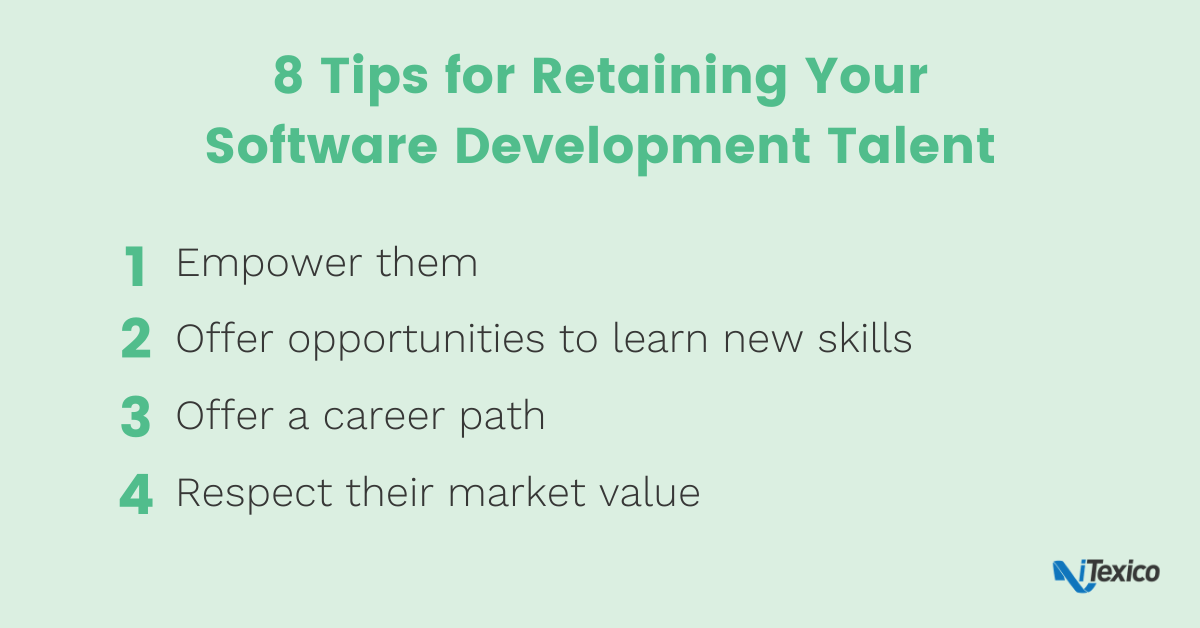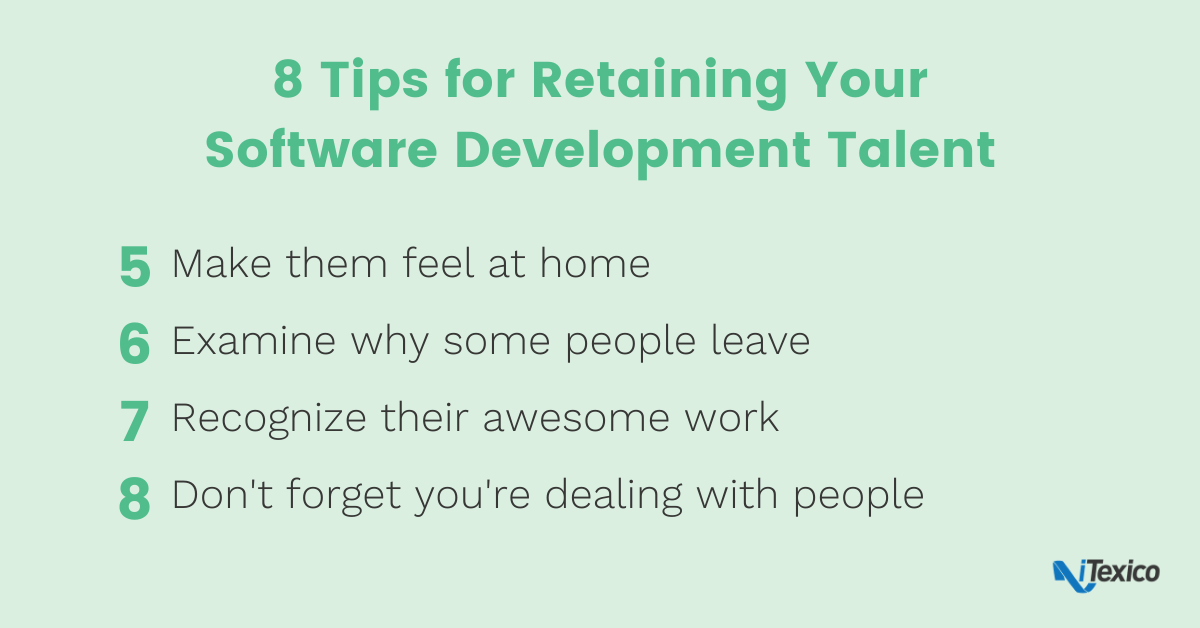Retaining Talent: How To Keep Your Software Developers Happy
Take the time out of your day to examine the current state of the software development talent pool. Set down your coffee, stand up, and look out the proverbial window to fully contextualize how important your present crop of engineers are to the sanctity and well-being of the company you hold so dear. Keep in mind that, at any given moment, for any number of reasons, you may lose this cultivated team of software developers you have.
The talent pool isn’t so stable that you can presume that, if you lose an engineer or two now, you can readily replace them with an equally qualified employee for the same cost. The waters are filled with sharks. The IT industry is a highly competitive one when it comes to attracting and retaining great talent, meaning you can’t rely on always topping off your teams with new, great software engineers. You need to try and keep the ones you’ve got.
Currently, the United States in particular is slogging through a software developer shortage, though it’s not the only country in the same pit. We aren’t churning out enough qualified developers to keep up with the demand of the industry, which creates disparities between skyrocketing wages, depreciating talent, and difficulty in finding capable team members that fit your criteria. Our article detailing the crisis of software developer shortage in the U.S. has more detailed information on this matter.
Good development teams are hard to find. Even if you do find a solid roster, there’s a chance that they’ll be poached and lured away by other IT recruiters. Therefore, employers must go the extra mile when it comes to satisfying the needs of their developers. With more attractive benefits, support, and opportunities provided, you’ll be more likely to not only be able to retain your current talent but also draw in new employees.
Tips for Retaining Your Software Development Talent
Obviously, there are no foolproof ways to ensure your employees stick with you for the long haul. People are beholden to their own free will, and that notion allows them to go their own way at any time. That’s not a problem, however, it’s actually a blessing in of itself. Those who actively choose to remain under your organization are better, more effective workers than those who are unwilling.
You want your software developers to want to work with you. To that end, we have a few recommended tips to help incentivize your talent to stay. The end goal is keeping your teams happy, healthy, and excited to work with you.

1. Empower Them
Like we were saying, free will is an expression of your employee’s ability to enact on their innate worth and talent. Those who work for you want to have their voice heard, to be a part of the process, and to have a say in what happens within the confines of your company. Every decision you’ll make will end up impacting them directly, so in order to keep them happy, you have to include them.
No matter the position they hold, you need to allow your engineers to participate in crucial decisions that may affect their work. Doing so is an empowerment of their place as both people and employees within the scope of your company. With every movement of the inner mechanisms that make up your workplace without their involvement, your software engineers will feel a greater impact to their morale and satisfaction.
By listening and, more importantly, acting on the feedback provided by your employees, you will be letting them know that you recognize their talent and value their input. This type of empowerment goes beyond just command decisions, being integrated into the very fabric of their working framework. While your developers are working on a project, it’s invaluable to allow for creative freedom to solve important problems. This work is, after all, their domain, meaning they should have a responsible level of independence within it.
2. Offer Opportunities to Learn New Skills
You should not expect the workplace environment to exist in a vacuum. Technology is in a constant state of flux, generating new products as well as coding languages or best practices. As the technological market continues to grow and evolve, and believe us when we say it will, your software developers should be provided the opportunities to grow with it.
Empowering your developers to grow and learn on a daily basis is the key to an adaptive, nurtured organization space. For instance, say your engineers encounter a problem and don’t know how to solve it. Hitting a roadblock directly proportional to the limits of their expertise will end up discouraging them, affecting the project and the company overall.
This is an opportunity to provide enrichment. Preemptively set up continual education opportunities so your workers can learn new languages. By the time they hit these roadblocks, they’ll be equipped with the means to overcome them. Allow them to master their projects, and encourage them to continuously improve while offering spaces for them to teach other employees at the company. This fosters a culture of self-determination and adds to employee benefits.
3. Offer Them a Career Path
Despite what we’ve been saying, about retaining talent and keeping them within your purview for as long as possible, the reality is that no one wants to stay in the same place forever. Why would they? That as a fact is not an indictment against your company and business practices, it’s simply an examination of the human condition. People want to move, to grow, to change their surroundings, not stagnate in one place forever. At some point, you have to let your software developers go.
The worst response to this is to stifle their attempts to do so. Rather than resist every chance your employees have to expand upwards, the right thing to do is to provide the means for them to do so. It’s both your moral right and best business practice to offer career development plans to everyone who needs them.
Look at it this way: if you’re repressing your workers’ attempts to grow, they’re going to start looking for other places to work. Instead of retaining that talent like you intended, your plans backfired and you’ve lost a valuable team member instead. Get started on avoiding that outcome by taking the first step and keeping lines of communication open. Let them know they can come to you with any progress ideas.
This olive branch is what keeps you informed as to how their career is progressing. Through a clear and open communication causeway you’ll be able to understand their skills, knowledge, capabilities, and how they could fit within higher ranking jobs. The upwards path may not end up with them leaving for greener pastures, they could end up staying within the company and climbing the ladder there.
Most importantly, be honest about what can and can’t be done. Throwing up smoke and mirrors or making promises you can’t keep does no one any favors. The more you obscure the truth, the greater the bite will be when it comes back around.
4. Respect Their Market Value
What exactly quantifies a person’s market value? There’s no definitive formula for that, it’s a highly personalized figure to record. Highly personalized means that, to do your due diligence, you’re gonna have to do some good old-fashioned research. What do your employees bring to the table? What do their experience, skillset, talent, and capabilities grant them on the market?
It’s important that you properly measure this value among other companies similar to yours - things that include perks, size, financial capabilities, and so on - and offer them what they’re worth. This may mean raises, added perks, and any other benefits that will keep your employees engaged to your business.
Every good employee deserves the respect that’s properly owed to them. Otherwise, they’ll dart off to the best opportunity that provides them the consideration rightly given.
5. Make Them Feel at Home
Granted “make them feel at home” sounds like a nold cliché, but just because it’s often heard doesn’t make it any less true. Any company can offer your guys more money, but pure cash amounts can’t be held over everything. What wins the loyalty of your employees in the end are twofold: the quality of the projects they’re in, and how comfortable they feel in their workspace.
Your workers shouldn’t come to work in the morning feeling like they’re stepping into a minefield. The attitudes and treatment they receive from those around them have an impact on their mindset, including their contentment with their work and how well they’ll cooperate with their peers and superiors. No one wants to spend eight hours a day within a hostile or uncomfortable atmosphere.
To combat this, you need to ride that cliché for all it’s worth. Offer great perks, team building activities, and foster a community of respect and open communication. Even providing something as trivial as free drinks and snacks can go a long way toward making the workplace a better environment. Do your research and understand what your competitors offer as well, so that you can make sure you’re not lagging behind.
6. Examine Why Some People Leave
Try as you might, everyone will leave at some point or the other. Even when you lose a valued member of your team, you can still learn from the experience to ensure you don’t have the same problem again in the future. Not all issues are solvable, but for those you can do something about, you’ll be able to learn about in an exit interview.
During the exit interview, you can dig into what factors contributed to this employee leaving your company. Pay attention to what feedback they give, as it’ll tell you a lot about how the programs and atmosphere at your organization can be altered to better accommodate your workers’ needs.
In fact, interviews in general shouldn’t be reserved just for the start and end of one’s employment at your company. Personally interacting with your software engineers is a great way to gain personal insight into the workplace’s inner workings, and as such can be periodically slotted into the work schedule. Have interviews whenever you notice a drop in productivity or a change in attitude. The quicker you identify the problem, the faster it can be taken care of.
There’s no better way to understand why some people prefer other companies than to talk to them openly and honestly about why they sought opportunities elsewhere. This will help you improve your current talent management processes, and understand when some things are just out of your control. It’s also important to note that these interviews may be uncomfortable for the prospective ex-employee, so you should establish that your respect for them remains established and that you wish for their best possible future.
7. Recognize Their Awesome Work!
Let’s be honest, would you ever feel good working in an environment where you’re never told you’re doing a good job? Whether we want to admit it or not, everyone needs to be validated when they’ve done good work. It can be as simple as a verbal congratulations and that’s all that needs to be done, so long as there’s recognition for honest hard work.
There’s nothing more satisfying than knowing your day to day job makes a difference in your company and also in your clients’ businesses. Let them know their work matters! Implement reward programs, praise them every time their tasks bring your team closer to their goals, provide small confidence boosters when it’s expected and even when it’s unexpected.
This is all a part of making your workers a part of your clients’ or your company’s wins. Sense of purpose is everything, and even the smallest of egos will be bruised if neglected. If you want your workers to feel valued, there needs to be incentive beyond the paycheck.
8. Don’t Forget You’re Dealing With People
At the end of the day, you’re running a business and you have to deliver. But that business is run by people. These people have emotions, ambitions, families, insecurities, problems, interests, and so many more things that make them a complex part of a complex machine. You can’t afford to get so caught up in completing objectives that you forget you’re dealing with true to life human beings, with all the good and the bad that come with them.
Look for a healthy balance between getting the job done right and letting them deal with life outside of work as well. If they feel they are just part of a meat butcher shop, they’re gonna run away. It’s neither ethical nor productive to treat your employees like they’re disposable. Building positive relationships with your team members facilitates a feeling of belonging, of camaraderie and brotherhood. You’re all sailors on a big ship, each and every member doing their part to keep the skimmer running
Conclusion
It cannot be stressed enough how you have to realize that these people working with and under you are just as extant as you are. Abide by the Platinum Rule: Do unto others as they would have done unto them. Everyone has their own criteria for how they should be treated, and those standards should be respected and abided by as best as you can.
iTexico specializes in helping teams grow into the best possible versions of themselves through Nearshore+ talent. Whether you’re looking to correct a problem you’re having with current teams or want to further expand on already stellar results, we’re here to help. To learn more about our Nearshore+ outsourcing service, please contact us at any point in the day.
Hand-Picked Related Reads For You

Nearshoring in Mexico – Right Talent, Right Time, Right Now
READ MORE

Is Mexico The New India?
READ MORE

iTexico: Top Mobile Development Company
READ MORE





Post Your Comment Here